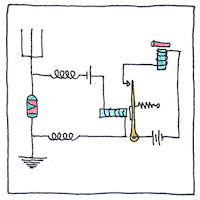Guglielmo Marconi
telecommunication

|
Radio
Inventor, engineer, entrepreneur, Guglielmo Marconi (pronounce his first name with a hard G, gee-YELL-moe), invented radio. Well, he didn’t invent it out of whole cloth. * In 1873, James Clerk Maxwell predicted electromagnetic waves could travel over a distance at the speed of light. In 1885, Thomas Edison filed a patent application for transmitting signals between distant points, using an “etheric force,” which he didn’t know were radio waves. In 1879, David Edward Hughes invented a spark-gap transmitter was able to pick up Morse-code signals up to five hundred yards using his carbon microphone and a telephone receiver, but his work was dismissed as merely induction. In 1887, Heinrich Hertz analyzed radio waves in the lab using a spark-gap transmitter and a half-wave dipole antenna, but Hertz did not consider this to be of any practical value. When Hertz’s results were published, David Hughes gave up his experiments. * As a young man, Marconi built his own equipment and experimented in his attic with the help of his butler, Mignani. Marconi improved the coherer receiver, increased the lengths of his antennas, oriented the antennas vertically, and let the transmitter antenna touch the ground, so that eventually he could transmit and receive miles beyond the line of sight.
Transoceanic
Marconi couldn’t get support in Italy so he moved to London. His first radio transmission over the sea crossed the English Channel in 1897. In December 1901, Marconi claimed that a signal transmitted from Poldhu, Cornwall, was received in Saint John’s, Newfoundland, using a five-hundred-foot antenna born aloft by a kite. Although this might have been impossible, Marconi was soon able to prove that the station at Poldhu could transmit to a ship two thousand miles across the Atlantic.
Beyond proof of concept
One way to establish a thing might be done and with how much effort is to do it. Some I’ve known did not like to propose to do anything unless they had already done it.



The Marconi company bought Edison’s patent, “Means for Transmitting Signals Electrically,” No. 465,971, to help indemnify themselves against the patent war that cast its shadow over them as World War II approached. Marconi did not make it easier when he joined the Italian Fascist party in 1923 and served Benito Mussolini on the Fascist Grand Council.
See also in The book of science:
Readings in wikipedia: